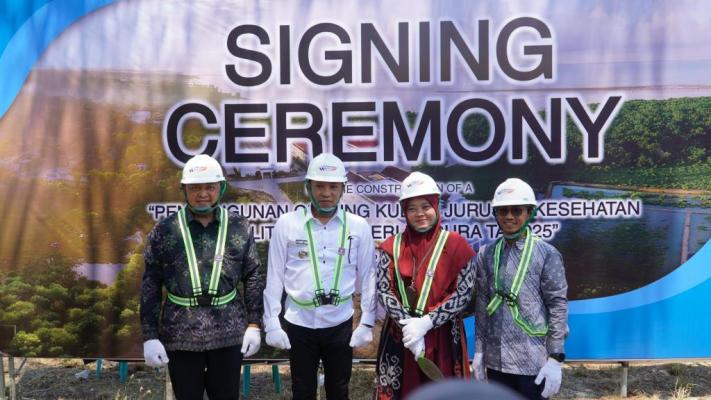- Home
- MediaOutReach
- CGTN:How China is empowering women and advancing 'her power'
CGTN:How China is empowering women and advancing 'her power'
Minggu, 12 Oktober 2025 | 10:15

BEIJING, CHINA -
Media OutReach Newswire - 11 October 2025 - An
article published by CGTN highlights China's upcoming Global Leaders'
Meeting on Women in Beijing, marking 30 years since the 1995 Beijing
Declaration. It reviews China's progress in women's empowerment under Xi
Jinping's leadership and its global contributions to gender equality,
while noting persistent worldwide challenges to achieving women's full
advancement.
Thirty years ago, the Beijing Declaration and Platform for Action, adopted at the Fourth World Conference on Women in Beijing, set the world on a new course, establishing strategic objectives and actions to advance women and achieve gender equality.
On October 13 and 14, again in Beijing, the Global Leaders' Meeting on Women will bring together stakeholders to renew the spirit of the 1995 Conference, accelerate the implementation of the declaration and platform for action, promote gender equality, support women's all-round development, and foster a community with a shared future for humanity.
Chinese President Xi Jinping, who will attend the meeting's opening ceremony and deliver a keynote speech, has long championed women's development globally. At the 2015 UN Global Leaders' Meeting on Gender Equality and Women's Empowerment, he outlined four guiding principles: synchronizing women's development with social and economic progress, safeguarding rights, fostering inclusive societies and creating favorable international conditions.
Through Xi's vision, China has provided practical pathways for advancing women's empowerment, creating a model of inclusive development and "her power" in action.
China's advance of 'her power'
Over the past three decades, China has consistently upheld the spirit of the Beijing Declaration and Platform for Action, achieving remarkable progress in women's rights and opportunities. Since 2013, targeted poverty alleviation has lifted millions of women out of poverty in the country, with 690 million now enjoying a moderately prosperous standard of living.
Meanwhile, women now constitute 45.8 percent of China's scientific workforce, over half of internet entrepreneurs and 42.3 percent of judges nationwide, reflecting greater leadership opportunities. And with an average life expectancy exceeding 80 years and recognition by the World Health Organization as a top performer in maternal and child health, women's well-being continues to improve steadily.
These accomplishments are rooted in institutional guarantees and decisive actions. Gender equality is enshrined as a basic national policy, and women's development has been incorporated into the country's Five-sphere Integrated Plan. Comprehensive measures – targeted poverty reduction, vocational training, universal access to education and robust health services – provide systematic support, ensuring women fully participate in and benefit from China's development.
Internationally, China has participated in global governance on women's issues, established platforms for exchanges and cooperation between Chinese and foreign women, and fostered an international environment conducive to women's development.
Over the past decade, China has donated $20 million to UN Women and established the Prize for Girls' and Women's Education in cooperation with UNESCO.
Since 2012, it has hosted 29 women's conferences under various frameworks to promote cooperation on women's issues and carried out women-related projects worth nearly $40 million across over 20 countries, according to a white paper titled "China's achievements in women's well-rounded development in the new era."
However, the world continues to grapple with persistent challenges such as gender-based violence, unequal access to education and employment, and underrepresentation in leadership roles. A UN Women report issued in mid-September warned that progress globally on gender-related targets is off track and the advancement of gender equality is backsliding.
If current trends persist, the world will reach 2030 with 351 million women and girls still living in extreme poverty, and the Sustainable Development Goals, particularly SDG 5 will be missed, according to the Gender Snapshot 2025 report, which also said 676 million women and girls live within reach of deadly conflict – the highest recorded since the 1990s.
As global leaders gather in Beijing to discuss a blueprint for women's development, UN Women Executive Director Sima Bahous expressed confidence in a successful meeting, noting that "China's experience in promoting gender equality offers valuable lessons for the world."
For more information, please click:
https://news.cgtn.com/news/2025-10-11/How-China-is-empowering-women-and-advancing-her-power--1HnOMBszEuk/p.html
Thirty years ago, the Beijing Declaration and Platform for Action, adopted at the Fourth World Conference on Women in Beijing, set the world on a new course, establishing strategic objectives and actions to advance women and achieve gender equality.
On October 13 and 14, again in Beijing, the Global Leaders' Meeting on Women will bring together stakeholders to renew the spirit of the 1995 Conference, accelerate the implementation of the declaration and platform for action, promote gender equality, support women's all-round development, and foster a community with a shared future for humanity.
Chinese President Xi Jinping, who will attend the meeting's opening ceremony and deliver a keynote speech, has long championed women's development globally. At the 2015 UN Global Leaders' Meeting on Gender Equality and Women's Empowerment, he outlined four guiding principles: synchronizing women's development with social and economic progress, safeguarding rights, fostering inclusive societies and creating favorable international conditions.
Through Xi's vision, China has provided practical pathways for advancing women's empowerment, creating a model of inclusive development and "her power" in action.
China's advance of 'her power'
Over the past three decades, China has consistently upheld the spirit of the Beijing Declaration and Platform for Action, achieving remarkable progress in women's rights and opportunities. Since 2013, targeted poverty alleviation has lifted millions of women out of poverty in the country, with 690 million now enjoying a moderately prosperous standard of living.
Meanwhile, women now constitute 45.8 percent of China's scientific workforce, over half of internet entrepreneurs and 42.3 percent of judges nationwide, reflecting greater leadership opportunities. And with an average life expectancy exceeding 80 years and recognition by the World Health Organization as a top performer in maternal and child health, women's well-being continues to improve steadily.
These accomplishments are rooted in institutional guarantees and decisive actions. Gender equality is enshrined as a basic national policy, and women's development has been incorporated into the country's Five-sphere Integrated Plan. Comprehensive measures – targeted poverty reduction, vocational training, universal access to education and robust health services – provide systematic support, ensuring women fully participate in and benefit from China's development.
Internationally, China has participated in global governance on women's issues, established platforms for exchanges and cooperation between Chinese and foreign women, and fostered an international environment conducive to women's development.
Over the past decade, China has donated $20 million to UN Women and established the Prize for Girls' and Women's Education in cooperation with UNESCO.
Since 2012, it has hosted 29 women's conferences under various frameworks to promote cooperation on women's issues and carried out women-related projects worth nearly $40 million across over 20 countries, according to a white paper titled "China's achievements in women's well-rounded development in the new era."
However, the world continues to grapple with persistent challenges such as gender-based violence, unequal access to education and employment, and underrepresentation in leadership roles. A UN Women report issued in mid-September warned that progress globally on gender-related targets is off track and the advancement of gender equality is backsliding.
If current trends persist, the world will reach 2030 with 351 million women and girls still living in extreme poverty, and the Sustainable Development Goals, particularly SDG 5 will be missed, according to the Gender Snapshot 2025 report, which also said 676 million women and girls live within reach of deadly conflict – the highest recorded since the 1990s.
As global leaders gather in Beijing to discuss a blueprint for women's development, UN Women Executive Director Sima Bahous expressed confidence in a successful meeting, noting that "China's experience in promoting gender equality offers valuable lessons for the world."
For more information, please click:
https://news.cgtn.com/news/2025-10-11/How-China-is-empowering-women-and-advancing-her-power--1HnOMBszEuk/p.html
BERITA LAINNYA

Minggu, 12 Oktober 2025 | 10:13

Sabtu, 11 Oktober 2025 | 11:58

Sabtu, 11 Oktober 2025 | 11:57

Sabtu, 11 Oktober 2025 | 08:11

Sabtu, 11 Oktober 2025 | 08:09

Sabtu, 11 Oktober 2025 | 08:08

Sabtu, 11 Oktober 2025 | 08:07

Sabtu, 11 Oktober 2025 | 08:05

Sabtu, 11 Oktober 2025 | 08:02

Sabtu, 11 Oktober 2025 | 08:00





















